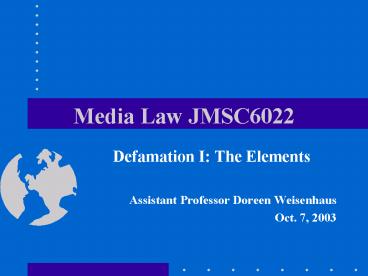Media Law JMSC6022 - PowerPoint PPT Presentation
1 / 18
Title: Media Law JMSC6022
1
Media Law JMSC6022
- Defamation I The Elements
- Assistant Professor Doreen Weisenhaus
- Oct. 7, 2003
2
Art. 27 of Basic Law vs. Art. 16 of Bill of
Rights Ordinance
- BL/Art. 27 Hong Kong residents shall have
freedom of speech, of the press and of
publication - BORO/Art. 16 Everyone shall have the right to
freedom of expression this right shall include
freedom to seek, receive and impart information
and ideas of all kinds, regardless of frontiers,
either orally, in writing or in print, in the
form of art, or through any other media of its
choice.
3
But what about Right to Reputation?
- BORO/Art. 16
- 3) The exercise of the rights...carries with it
special duties and responsibilities. It may
therefore be subject to certain restrictions, but
these shall only be such as are provided by law
and are necessary-(a) for respect of the rights
or reputations of others or (b) for the
protection of national security or of public
order, or of public health or morals.
4
Freedom of Speech in HK, according to the CFA
- The freedom of speech (or the freedom of
expression) is a freedom that is essential to
Hong Kongs civil society. It is constitutionally
guaranteed by the Basic Law (Article 27). The
right of fair comment is a most important element
in the freedom of speech. In a society which
greatly values the freedom of speech and
safeguards it by a constitutional guarantee, it
is right that the courts when considering and
developing the common law should not adopt a
narrow approach Court of Final Appeal, Albert
Cheng case.
5
What is defamation?
- Damages for harm to reputation (a tort)
- Consists of libel (usually written, more
permanent form) and slander (oral, more transient
form) - Why distinction important? If slander, plaintiff
must prove special damages. - Some exceptions If allegations are of unfitness
for ones business calling (D.O. 23), female
unchastity (D.O. 21), loathsome disease,
criminal offense.
6
Some defamation history
- Defamation began in 11th century, recognized in
ecclesiastical courts. - Slander a criminal offence in 13th century, seen
as threat to civil order. The greater the truth
the greater the libel Lord Chief Justice Coke.
- Star Chamber enforced libel laws, later
permitted civil actions when it banned dueling. - Courts began to recognize in Europe in 16th
century - Became part of US common law early but never as
rigorously applied as UK, where seen to protect
class system. (G. Robertson) Note, in 18th c,
claimant had to prove that words were false and
had caused damage. By 19th, 20th c, presumptions
reversed - US 2 advantages 1st Amendment invoked to argue
balance must favor freedom of pressNo provision
in US Constitution guaranteeing protection of
reputation
7
Hong Kong Defamation Law
- Controlled by
- 1. Common law
- 2. Defamation Ordinance
- 3. Basic Law Art. 27 freedom of speech, of the
press and of publication (see Albert Cheng
case) - 4. Bill of Rights Ordinance
8
Defamation Ordinance
- Regulates particular elements.
- It is NOT a code. You do not bring a suit under
Defamation Ordinance. - Clarifies that certain situations are libel (s.22
broadcasting) - Adds to situations where slander is actionable
per se (s. 21 unchastity) - Slightly expands some defenses like justification
- Creates certain qualified privilege situations
9
Unusual features of defamation
- Jury trials (rare for civil cases in HK)
- Burden of proof
- Cause of action ends with death of plaintiff
(contrast PRC) - Injunction not typical, just damages later
- No legal aid
10
Who can sue?
- Live individuals
- Companies (but only if statements damage business
reputations) (e.g., Oriental) - Other entities like charities
- Generally not public authorities (but see HK
Polytechnic case)
11
Who can be sued?
- author
- publisher
- printer
- seller
- library
- Commercial Radio case Radio station, but not
radio hosts, found liable for comments made by
listeners in phone-in show
12
3 Elements in Defamation
- Defamatory statement
- 2) Identification of plaintiff
- 3) Publication of statement
- Think D.I.P.!
13
2 steps for a defamatory statement
- What does it mean?
- Is based on natural and ordinary meaning
(Claudia Mo, Robert Chan) - Not dictionary meaning, but what would ordinary
man infer? - loose words (Berkoff, Mo, Chan)
14
2 steps for a defamatory statement
- 2) Is it defamatory?
- Is false and derogatory in such a way as to
expose the person to hatred, ridicule or
contempt? (Berkoff, China Youth) - Does it lower the reputation in the estimation of
the reasonable person right- thinking member
of society (shifting?) - Untrue, hurtful not enough
15
A plaintiff is identified when
- A third party understands who the statement
refers to (Claudia Mo) - Test would reasonable persons believe that the
words refer to the plaintiff? - It does NOT mean person or entity must be
mentioned by name - What about a group or class of individuals?
16
A statement has been published
- When communication has been made to more than 1
person. In other words, a 3rd party. - Each communication is a separate publication
- What is the repetition rule?
17
What plaintiff does NOT have to show
- Intention of writer. Strict liability.
- Effect on reader (except innuendo)
- Actual harm. (unless for slander and special
damages but more on that later) - Innuendo Where defamatory meaning is only
apparent to those with special knowledge.
Plaintiff must show they were within actual
readership.
18
Reversal of burden of proof
- If plaintiff can show the 3 elements (DIP), then
burden shifts to defendant. - Remember, the presumption is that if these
elements are met, then defendant will be found
liable for defamation unless he can prevail on a
permissible defense.































